« World Record for Swedish Painting | Main | World's Fastest Yacht, Esimit Europa 2, Officially Launched in Cannes, France »
June 12, 2010
FIFA World Cup and the Economy: ING Studies Correlation Between the Two

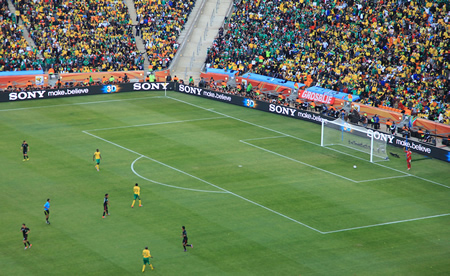
Photo: General view during the 2010 FIFA World Cup South Africa Group A match between South Africa and Mexico at Soccer City Stadium on June 11, 2010 in Johannesburg, South Africa. (Photo by David Cannon/Getty Images for Sony. © 2010 Getty Images)
• Brazilians Would pay Most for World Cup Title
Brazilians would be willing to pay more than 800 euros each in exchange for the World Cup football title. Together with the Portuguese (368 euros), they would be prepared to dig deepest into their pockets in exchange for the World Cup glory. At 47 euros a head the Dutch are more frugal, but still more generous than the Germans or Japanese. Brazilians are also the most optimistic about their chances, with nearly three out of four people surveyed believing the 'divine canaries' will take the title. Other countries also see Brazil as hot favourites, with only the Argentineans and the Spaniards believing they have a better chance of winning than the Brazilians. To support their national teams, consumers will be buying masses of fan gear over the next few weeks. On average the French and English will spend 15 euros each, with the Spanish buying more than 27 euros worth of gear and souvenirs. These are some of the findings of a comprehensive study by ING into the correlation between the World Cup and the economy.
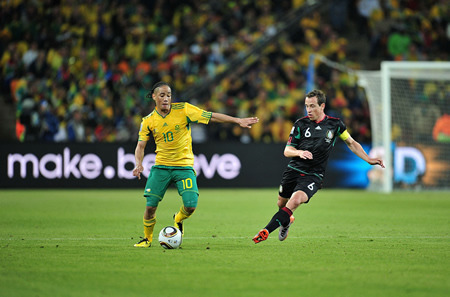
Photo: Steven Pienaar of South Africa and Gerardo Torrado of Mexico compete for the ball during the 2010 FIFA World Cup South Africa Group A match between South Africa and Mexico at Soccer City Stadium on June 11, 2010 in Johannesburg, South Africa. (Photo by Clive Mason/Getty Images for Sony. © 2010 Getty Images)
• Impact of the World Cup on the economy
As the main sponsor of the Dutch national squad, ING is launching various initiatives in connection with the World Cup. One of these is the 'ING WK-nomie' (ING World Cup-onomics) study. Charles Kalshoven, chief economist at the ING Economic Bureau Retail Netherlands: "The further the Dutch go, the better it will be for the Dutch economy. A similar effect can be seen in other participating countries. The impact of the World Cup can be felt in the workplace and in shops, but also in consumer confidence and spending."
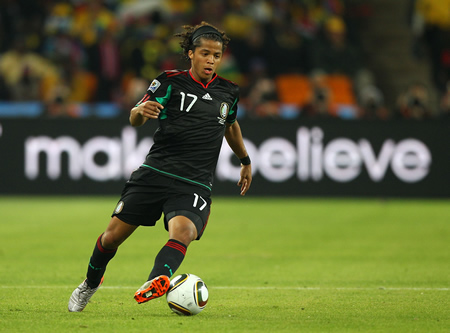
Photo: Giovani Dos Santos of Mexico controls the ball during the 2010 FIFA World Cup South Africa Group A match between South Africa and Mexico at Soccer City Stadium on June 11, 2010 in Johannesburg, South Africa. (Photo by Michael Steele/Getty Images for Sony. © 2010 Getty Images)
• Sacrificing days off to win the World Cup
In the Netherlands one in every five people would be prepared to give up more than a full working week in days off in exchange for winning the World Cup. As with putting a price tag on winning the World Cup, most other countries are more generous in this respect. In Brazil and Argentina, 72% and 79% of the population, respectively, would be willing to sacrifice days off. On average they would gladly lose three full working weeks of holidays in exchange for winning the title. In contrast, the Japanese and Americans would be less prepared to give up their days off.
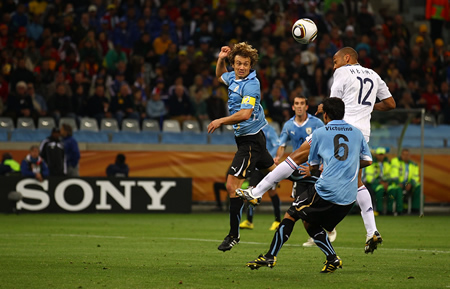
Photo: Thierry Henry (R) of France takes a shot at goal during the 2010 FIFA World Cup South Africa Group A match between Uruguay and France at Green Point Stadium on June 11, 2010 in Cape Town, South Africa. (Photo by Lars Baron/Getty Images for Sony. © 2010 Getty Images)
• Anglo countries watch fewer World Cup games
Enthusiasm for the World Cup differs from country to country. For example, 58% of Americans say they will not be watching any World Cup games. Remarkably, a large percentage of people in other English-speaking countries - England (42%), Australia (43%) - will not be watching games either. Many fans in Mexico and Portugal watch the games in bars (28% and 26%, respectively), whereas Portuguese people prefer watching the games at home and Brazilians get together with family and friends.
To underpin their support for their national teams, people are stocking up on fan gear. On average the Dutch are spending 5 euros while the French and English are buying 15 euros worth of gear per person. The Spanish are spending even more: on average 27 euros each.
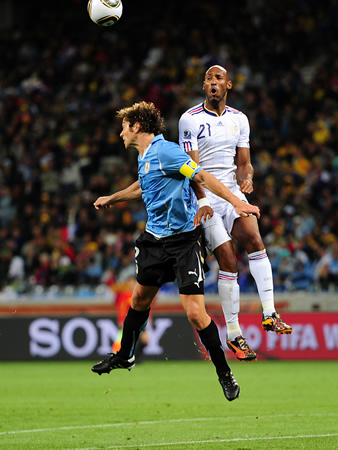
Photo: Nicolas Anelka of France and Diego Lugano of Uruguay compete for the ball during the 2010 FIFA World Cup South Africa Group A match between Uruguay and France at Green Point Stadium on June 11, 2010 in Cape Town, South Africa. (Photo by Jamie McDonald/Getty Images for Sony. © 2010 Getty Images)
• Social significance of football
The way that people experience the World Cup and the value they attach to winning it appear to be linked to the social significance a country attaches to football. ING asked people in 12 participating countries which career they would ideally choose for their sons. Brazilians (39%) and Argentineans (32%) dream most of a professional football career for their sons, followed by Spaniards and Mexicans (both 29%). This preference was the weakest in Germany and Japan at a mere 7%. The Dutch would most like to see their sons become company executives (61%), with a professional football career in third place (13%) - still well ahead of a career as a movie star (4%) or Prime Minister (only 2%).

Photo: Singer Shakira poses for photographs during Sony World Cup Opening 3D Launch Show at Nelson Mandela Square on June 8, 2010 in Johannesburg, South Africa (Photo by Jim Dyson/Getty Images for Sony. © 2010 Getty Images).
• Brazilians and Spaniards most confident about own chances
Brazilians are most confident about their own team with nearly three-quarters of the people surveyed expecting the 'divine canaries' to take the cup home. Brazil are also hot favourites with people surveyed in other countries. Only Argentina and Spain believe they have a better chance of winning than Brazil.
On average, Spaniards give themselves a 58% chance of taking the cup home. Argentineans also have faith in their national squad and think they have a 48% chance of winning for the first time since 1986. The Dutch give their squad a 34% chance of success. Remarkably the Mexicans have more faith in the Dutch team than the Dutch do, while Italians are least convinced that the Dutch will hoist the trophy.
• ING is a global financial institution of Dutch origin with more than 85 million customers in Europe, the US, Canada, Latin-America, Asia and Australia. ING Bank N.V. is headquartered in Amsterdam, The Netherlands.
Source: ING
• The Castrol Predictor: Who will win the World Cup?
(Two of the world's most passionate footballing nations, Spain and Brazil, are favorites to go head to head in the 2010 FIFA World Cup(TM) Final according to the Castrol Predictor, a new tool launched by 2010 FIFA World Cup(TM) sponsor Castrol. The Castrol Predictor, uses objective analysis and highly advanced technology to offer unique insights into winning performances.)
|GlobalGiants.Com|







Edited & Posted by the Editor | 3:56 AM | Link to this Post








